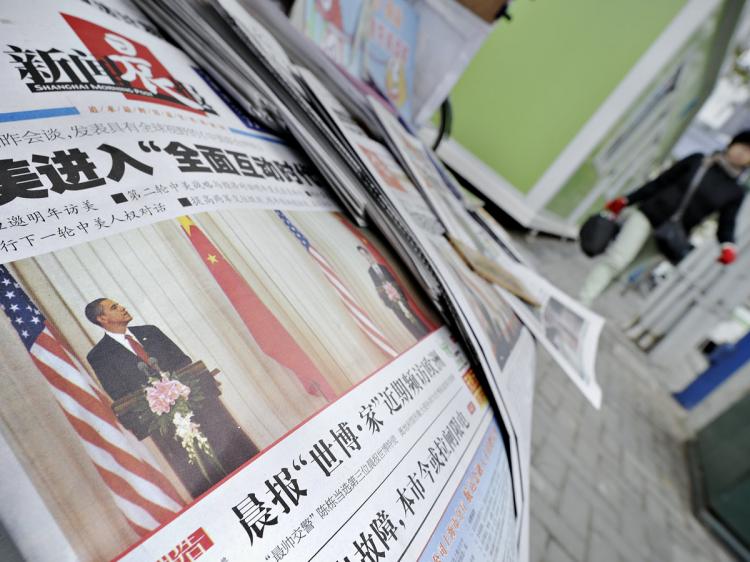The tone of President Barack Obama’s visit to China was set early on. Leading up to the visit, “soft arrests” of dissidents spread throughout the country—house arrests and monitoring by police. CNN reporter Emily Chang and her camera crew were also briefly arrested after filming a t-shirt that depicts Obama as Mao Zedong, the first communist leader in China. The shirts have been all the rage in China since Obama’s election in 2008.
Obama’s Monday town hall speech to a group of students in Shanghai received the same treatment. It was hoped that the speech would be broadcast live across China, but was televised only on local TV and was given before a group of hand-picked students.
Obama and Chinese Communist Party (CCP) leader Hu Jintao acknowledged early on that both countries have their differences, which were set aside temporarily for the three-day visit.
According to Freedom House Asia research analyst Sarah Cook, the CCP’s censoring Obama’s experience of China by arresting and monitoring dissidents, while at the same time limiting Obama’s speech to the Chinese people, points to an insecurity within the CCP’s system.
“It’s very sensitive and very afraid of its own citizens,” Cook said. “It’s very sensitive to dissent.”
Human Rights
The issue of human rights remains a sensitive subject between the two countries. Obama approached the subject cautiously.
“The president referred explicitly to the importance of protection of freedom of religion and the rights of ethnic minorities, and then immediately discussed the importance of a resumption of a dialogue between the Dalai Lama and representatives—the Dalai Lama’s representatives and the Chinese government,” said Senior Director for the National Security Council for Asian Affairs Jeff Bader in a Tuesday press conference.
The Dalai Lama told Italian news agency ANSA on Tuesday that he welcomes talks between China and Tibet.
Obama did, however, acknowledge Tibet as a part of Chinese territory—to the liking of the CCP’s leadership. Obama also refused to meet with the Dalai Lama when the Tibetan spiritual leader was in Washington last month. The meeting is being rescheduled until after Obama’s China visit.
Social Stability
“The primary purpose of this trip was establishing good relations,” said Matthew Gertken, a China analyst for global intelligence company Stratfor.
A few deals were sealed, which were outlined in a U.S.-China joint statement on Tuesday. Among them were deals on environmental policy, most of which were previously in progress.
“This was just kind of a formal recognition of this process,” said Gertken. “For everything else it was just a kind of reiteration on both sides that they hope relations will continue to be good.”
Trade remained the largest concern. With China having an export-based economy and with a fifth of its exports going to U.S. consumers, the country remains dependent on the U.S. market.
“It’s crucial to keep in mind that for the Chinese this is an issue of social stability,” said Gertken. “If their economy starts to slow down and they can’t maintain job creation and employment levels, then they’re going to have real political and social problems on their hands.”
“Trade is the biggest one that both sides are worried about, and China knows that it’s highly vulnerable,” said Gertken. “It needs the U.S. to recover, and it needs the U.S. also to not resort to protectionism or any kind of trade barriers.”
One of the issues that went unanswered from CCP leaders was the U.S. request to raise the value of the Chinese currency.
According to Gertken, “The Americans have often harped on China for allowing its currency to depreciate, because its currency is considered to be lower in value than it really should be. Then they’re able to surge their exports and steal market shares from other economies, including the U.S.”
The issue of China’s currency was also raised during a press conference in Beijing on Tuesday. Deputy National Security Adviser Mike Froman guided the answer to trade between the U.S. and China.
“China’s stated intention to liberalize or to move to a more market-oriented exchange rate over time … was an essential component of balanced growth,” said Froman, adding that he would not “characterize the nature” of the Chinese response.



![[LIVE Q&A 04/25 at 10:30AM ET] Why Is Australia Going After Elon Musk?](/_next/image?url=https%3A%2F%2Fimg.theepochtimes.com%2Fassets%2Fuploads%2F2024%2F04%2F24%2Fid5636785-CR-TN_REC_0425-1080x720.jpg&w=1200&q=75)



Friends Read Free